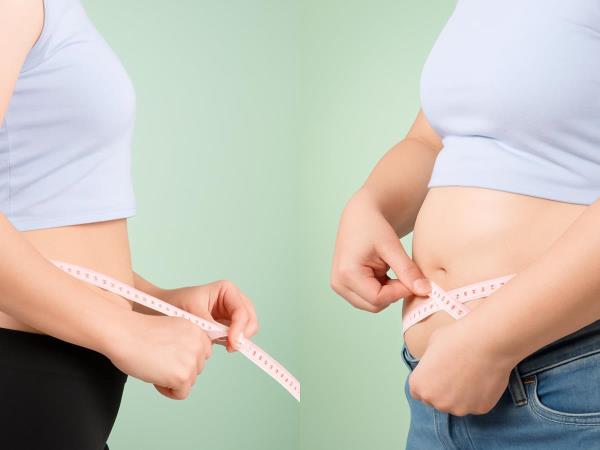Danish scientists followed 85,761 people in a multi-year study, of which 81.4% were women, and the average age at the start of the study was 66.4 years. During a five-year period, 7,555 participants died, which is about 8% of those in the study.
Here’s the key finding: people whose body mass index (BMI) was below 18.5 (which means excessively thin) had a 2.7 times higher risk of death compared to those in the reference group with a BMI between 22.5 and 25. People with a BMI between 18.5 and 20.0 had twice the risk of death compared to the reference group, and those with a BMI between 20 and 22.5 had a 27% higher risk.
BMI stands for body mass index: the ratio of body weight to the square of height, expressed in kg/m2.
On the other hand, people who were overweight (BMI between 25 and 30) or mildly obese (BMI between 30 and 35) did not have a higher mortality rate than the reference group (BMI 22.5–25).
Only with more pronounced obesity (BMI 35–40) was there an observed increase in risk of death by about 23%.
Thinness is not synonymous with health
When we hear the words thin or slim, we often imagine this as the ideal, but the research shows it’s not necessarily so. If your body doesn’t have enough reserves, it can quickly fail in case of troubles, such as illness or a drop in immunity. Researchers partly explain this with the term reverse causation, which means that some people lost weight due to illness and not the other way around—so low body weight can be a sign of an underlying problem.
The scientific lead of the study, Dr. Sigrid Bjerge Gribsholt from Aarhus Hospital (Denmark), explains: Malnutrition is a serious risk factor.
It’s true that thinness itself isn’t always the main cause, but being in a state where the body lacks enough energy, nutrients, or support is a problem. We say that malnutrition is when the body does not have enough building blocks (nutrients) to function normally and maintain the immune system, repair tissues, and keep hormonal balance.
Hidden factor – visceral fat
The study also points to the importance of visceral fat. Visceral fat is the fat (fat tissue) that gets stored deep in the abdomen, around the liver, intestines, and other organs—not the fat under the skin we can see. This is internal, less visible fat. Scientists note that, even if someone has a normal or low body weight, if they have a lot of visceral fat, the risk of cardiovascular diseases and accelerated aging of the heart and blood vessels is significantly higher.
For example: men who store fat mainly on their abdomen (“apple shape”) usually have faster aging of the heart. In women, if fat is stored more around the hips and thighs (“pear shape”), the heart is often in better condition. This means that it’s not just about how much fat we have, but also where we have it.
What this means and why it concerns all of us
Neither extreme thinness nor severe obesity guarantees a healthy and long life. Balance is the key. If you have extremely low body weight, you’re at higher risk. And if you’re very obese, likewise. Therefore, pay attention: if your body weight is very low (BMI below 18.5) it makes sense to check the reasons (nutrition, illness, poor appetite...).
Don’t boast just about slimness. If you’re slim but have no muscle mass, poor nutrition, or lots of visceral fat, this is not healthy. If you’re slightly overweight (BMI 25–30), this does not automatically mean poor health, but you should pay attention to movement, diet, and fat distribution. Also check your body build: do you have apple shape (more fat around the abdomen) or pear shape (more around the hips)? For apple shape you need to be more vigilant.
Nutrition should be balanced: enough protein, healthy fats, fiber. Sleep and physical activity are also important. Both!
How to start
We advise you to take steps that don’t require expensive equipment or specialized tests:
- Daily walk or light exercise (20–30 minutes): we can’t call this a workout, more like a walk, a talk... Just know that regular movement helps improve fat and muscle metabolism.
- Simple test for where your fat is stored: after a shower, stand in front of a mirror and notice where your skin feels softer: on your belly or hips. If your belly is softer, be cautious.
- Nutrition that gives energy: don’t skip breakfast. Include, for example, oats + nuts or yogurt. Lunch and dinner should include lots of vegetables, whole grains, healthy fats (olive oil, avocado), and protein (eggs, fish, legumes).
- Take measurements once a week: measure your height and weight, calculate your BMI (simply: weight (kg) {-15433} height2 (m2)). If BMI is less than 18.5, be attentive. If it’s between 25 and 30, pay attention to other factors such as body shape.
- Sense for health: Listen to your body! If you have no appetite, lack energy, or feel tired for no real reason, this is a warning sign. For thinness, the background is often nutrient deficiency or chronic disease. For obesity, poor metabolism and uneven fat storage are often to blame.
Being excessively thin is not automatically a sign of excellent health. Likewise, mild obesity is not necessarily a sign of poor health. The key is to have a balanced diet, regular movement, and good awareness of where the fat is in your body, how it is distributed, and whether you have enough muscle or energy.
If you maintain a healthy attitude toward your body, listen to science, and at the same time use practical, home solutions, you will be much more on the path to a healthy life and longevity.
Balance is important—not obsession with the number on the scale.









 Would you like to be informed about news on the website?
Would you like to be informed about news on the website?

